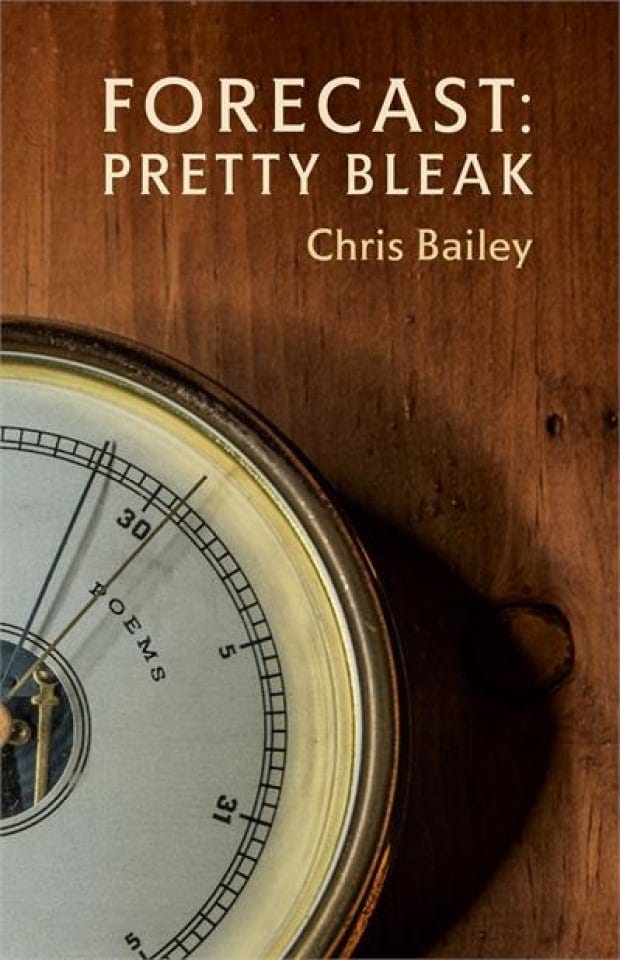Forecast: Pretty Bleak by Chris Bailey
A Review by Selena Mercuri
Chris Bailey’s Forecast: Pretty Bleak is a poetics of hard weather, hard work, and the quiet devastations of rural life on Prince Edward Island. With a voice defined by vernacular resilience, Bailey maps the emotional topography of lives shaped by labour, migration, and the slow, often invisible erosion of hope.
There is a remarkable compression to Bailey’s line. His images land with the weight of weather systems: “Your father at the electric kettle on the counter, / weight on his palms watching snow / out the west window with its north-wind slant.” Such moments typify the collection’s careful balancing of plainness and poignancy, a quality that invokes the lineage of contemporary Canadian poets like Sue Goyette and Don McKay, who chart the intersections of ecological and emotional weather.
One of the collection’s greatest strengths is its ability to portray rough-edged masculinity without caricature. In pieces like “Landing Day” and “Augustus,” Bailey captures the bluster and bravado of men drinking away the ache of bodies and histories too long at work: “I wanna talk to my friends who drink the clear stuff / I gotta go to the goddamned graveyard.” Bailey allows the undercurrents of vulnerability to surface without being named.
The collection’s first section, “Where Most Accidents Happen,” introduces a recurring motif of generational inheritance—not only of work, but of silence, bitterness, and a particular kind of endurance. Fathers, uncles, cousins, all emerge as figures haunted by mortality, their bodies increasingly unreliable: “The catch / with bad habits is that they catch up,” one father warns, the kettle clicking off as punctuation. Bailey’s use of direct speech, often italicized or offset, heightens the authenticity of these exchanges without lapsing into sentimentality: “That’s how it goes. You don’t know when. Just. Bang.”
One of the collection’s greatest strengths is its ability to portray rough-edged masculinity without caricature. In pieces like “Landing Day” and “Augustus,” Bailey captures the bluster and bravado of men drinking away the ache of bodies and histories too long at work: “I wanna talk to my friends who drink the clear stuff / I gotta go to the goddamned graveyard.” Bailey allows the undercurrents of vulnerability to surface without being named. Time, here, is a tidal force: “What you do and what you want / to do are not the same thing. Time’s tide rips / you off to the Rafter for the Landing Day dance.”
There are echoes, too, of Seamus Heaney’s early collections in Bailey’s attention to manual labour and physical environment. Like Heaney’s bog bodies, Bailey’s characters are marked by the land and sea that sustain and undo them. Yet Bailey’s Prince Edward Island is not a mythic space—it is a working one, scarred by economic precarity and environmental uncertainty. Climate change hovers at the margins of many poems, an invisible pressure system tightening the air.
Forecast: Pretty Bleak insists on the dignity of enduring, of speaking plainly about what hurts and what cannot be fixed. Bailey’s work reminds us that sometimes survival itself is a form of protest, and that bearing witness, however bleak the forecast, is a radical act.
Chris Bailey is a graphic designer and commercial fisherman from Prince Edward Island. He holds a MFA in Creative Writing from the University of Guelph. Chris’ writing has appeared in Grain, Brick, The Fiddlehead, Best Canadian Stories 2021, Best Canadian Stories 2025, and elsewhere. His debut poetry collection, What Your Hands Have Done, is available from Nightwood Editions. His piece Fisherman’s Repose was a winner of the 2022 BMO 1st Art! Award. Forecast: Pretty Bleak is his second poetry collection.
Book Details
Publisher: McClelland & Stewart
Language: English
Paperback: 104 pages
ISBN-13: 978-0771020490




